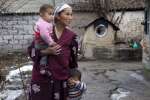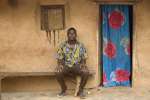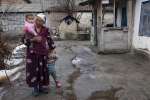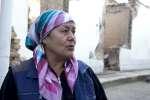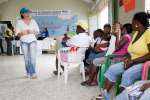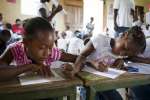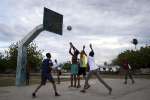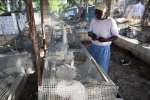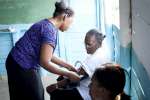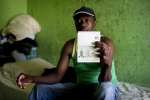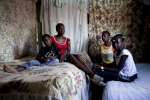- Text size
 |
|  |
|  |
| 
- عربي
Stateless and crying for help from the beloved country
Telling the Human Story, 27 November 2014
DUÉKOUÉ, Côte d'Ivoire, November 27 (UNHCR) – When asked about his past, Ousmane* hesitates, clearly reluctant to talk about it. He has suffered a great deal in his life, and it pains him to recount bad memories.
Once he realizes that his UNHCR visitors are friends, he begins to open up and tell his harrowing tale of life without a nationality. His recollections of childhood are hazy – he knows only that he was born in a small village in south-east Côte d'Ivoire, across the border from Ghana, that his mother was a citizen of Burkina Faso, or Burkinabé, and that his father disappeared when he was young.
But when asked what nationality he has, Ousmane cannot answer. Like many other children born in rural areas of Côte d'Ivoire, the 33-year-old was not registered at birth. He was born out of wedlock, but his mother died shortly after his birth and Ousmane's father was never identified. He was raised in the Burkinabé community.
To make matters worse, he cannot produce any documents that confirm his parents' identity or prove his own nationality. Neither the Ivorian nor the Burkina Faso authorities recognize him as a national of their country. Like more than 10 million other people in the world, he is stateless.
But rather than accepting his legal limbo, Ousmane is trying to do something about it. And he has the support of UNHCR, which is lobbying the authorities to resolve his status, either through the recognition of Burkinabé citizenship or as a stateless person in Côte d'Ivoire entitled to rights, including the right to an ID.
UNHCR earlier this month launched a campaign to end statelessness by 2024, urging governments to change their laws and recognize stateless people. Without legal recognition, many stateless people lack access to basic rights, including travel, education and employment.
The government of Côte d'Ivoire in April launched a special programme to enable certain groups who have been living on Ivorian soil for generations to acquire nationality by declaration. This new temporary procedure is intended to resolve the problem of historical migrants who were legally entitled to acquire Ivorian nationality, but failed to do so in time.
Ousmane discovered how difficult life without a nationality could be, when he tried to escape a life of exploitation. In 1987, aged just six years, he was taken from his village by a woman who claimed to be an aunt and sold him to a landowner in Gbapleu, about 650 kilometres north-west of the Côte d'Ivoire capital Abidjan.
Over the next eight years, he was forced to work in the cocoa plantations of an abusive landowner. He had to clear brush, plant and pick cocoa beans and plough fields, and was severely beaten if he complained or was too slow. "They would hit me across the face, across the chest, over and over again," he says.
Being stateless made him more vulnerable; without legal status it was difficult for him to make a formal complaint. But one day, when he was about 14, Ousmane escaped and made his way to his birth village in search of relatives. Since he had no documents, he did what many stateless people desperate for some kind of legal identity do.
He obtained the consular card of a young Burkinabé man who had recently died and used it to cross the country and get past checkpoints. The card is issued by the Burkina Faso authorities to Burkinabés living in Côte d'Ivoire to confirm their citizenship. There was no sign of his elusive father, so Ousmane had little choice but to return to Gbapleu, where he at least knew people.
He realized more and more over the ensuing years that his lack of documentation was a serious problem – if he was caught using someone else's identity card, he could face criminal charges. So he eventually decided to apply for a consular card from the Burkinabé mission in Duékoué, one of the main towns in western Côte d'Ivoire.
With this document, he would be able to prove that he was recognized by the authorities as a Burkinabé citizen and receive assistance from the Burkina Faso authorities. But, with no documents to confirm his identity other than a stolen ID card, his application was immediately rejected.
To avoid further abuse and stigma, he contacted staff at a local social services centre and they put him in touch with UNHCR. At the time, he was planning to leave Gbapleu the next day, in search of assistance but mostly to escape further forced labour or beatings. He hopes that, with UNHCR support, his case will be successful, but he remains stateless and will continue to live on the margins of society, vulnerable, poor and easy to ignore.
* Name changed for protection reasons.
By Nora Sturm in Duékoué, Côte d'Ivoire









